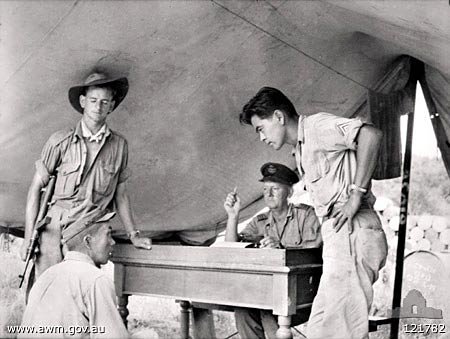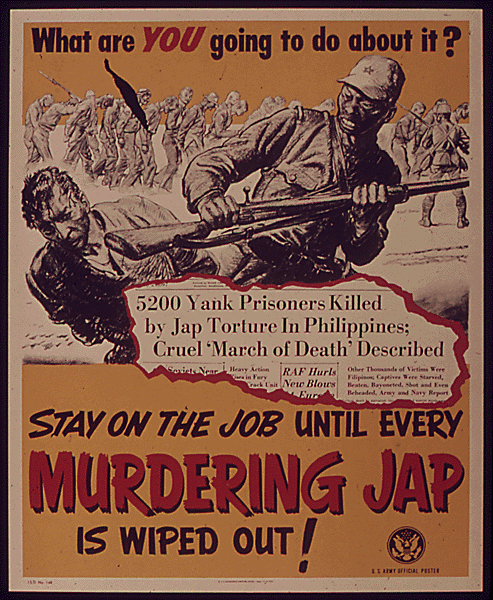B-29 CREWS TORTURED BY THE JAPANESE - Page 6
Other trials
 �
�
Sgt. Naoji confessed to killing two Australian POWs
and five Chinese
October 26, 1945, Sandakan, North Borneo. During the investigation into Sandakan Death Marches and other incidents, Sergeant Hosotani Naoji (left, seated), a member of the Kempeitai unit at Sandakan, is interrogated by Squadron Leader F. G. Birchall (second right) of the Royal Australian Air Force, and Sergeant Mamo (right), a Nisei member of the U.S. Army/Allied Translator and Interpreter Service. Naoji confessed to shooting two Australian POWs and five ethnic Chinese civilians.
Besides the Tokyo Trials, other prosecutions of Japanese personnel for war crimes were also held in many other cities throughout Asia and the Pacific, during 1946?51. Some 5,600 Japanese personnel were prosecuted in more than 2,200 trials. The judges presiding came from the United States, China, the United Kingdom, Australia, the Netherlands, France, the Soviet Union, New Zealand, India and the Philippines. More than 4,400 Japanese personnel were convicted and about 1,000 were sentenced to death. The largest single trial was that of 93 Japanese personnel charged with the summary execution of more than 300 Allied POWs, in the Laha massacre (1942).
Official apologiesThe Japanese government considers that the legal and moral positions in regard to war crimes are separate. Therefore, while maintaining that Japan violated no international law or treaties, Japanese governments have officially recognised the suffering which the Japanese military caused, and numerous apologies have been issued by the Japanese government. For example, Prime Minister Tomiichi Murayama, in August 1995, stated that Japan "through its colonial rule and aggression, caused tremendous damage and suffering to the people of many countries, particularly to those of Asian nations", and he expressed his "feelings of deep remorse" and stated his "heartfelt apology". Also, on September 29, 1972, Japanese Prime Minister Kakuei Tanaka stated, "The Japanese side is keenly conscious of the responsibility for the serious damage that Japan caused in the past to the Chinese people through war, and deeply reproaches itself."
However, the official apologies are widely viewed as inadequate by many of the survivors of such crimes and/or the families of dead victims. The subject of official apologies is controversial as many people aggrieved by alleged Japanese war crimes maintain that no apology has been issued for particular acts and/or that the Japanese government has merely expressed "regret" or "remorse".On 2 March 2007, the issue was raised again by Japanese prime minister Shinzo Abe, in which he denied that the military had forced women into sexual slavery during World War II. He stated, "The fact is, there is no evidence to prove there was coercion." Before he spoke, a group of Liberal Democratic Party lawmakers also sought to revise Yohei Kono's 1993 apology to former comfort women.
However, it provoked negative reaction from Asian and Western countries, for example, The New York Times editorial on March 6, ?These were not commercial brothels. Force, explicit and implicit, was used in recruiting these women. What went on in them was serial rape, not prostitution. The Japanese Army?s involvement is documented in the government?s own defense files. A senior Tokyo official more or less apologized for this horrific crime in 1993. Yesterday, he grudgingly acknowledged the 1993 quasi apology, but only as part of a pre-emptive declaration that his government would reject the call, now pending in the United States Congress, for an official apology. America isn?t the only country interested in seeing Japan belatedly accept full responsibility. Korea and China are also infuriated by years of Japanese equivocations over the issue.?
According to the Oxford English Dictionary, an apology is "a formal, public statement of regret", and moreover, the Japanese word for "apology" itself has also been used on several occasions. Some allege that the media in some countries "glosses over" or hides efforts at reconciliation by Japan, including "generous" Japanese aid packages, especially in countries where media outlets are under formal or de facto state control. It is further alleged that this reflects anti-Japanese sentiment.
German Nazis propaganda also justified their persecution of the Jewish people on the paranoic ground that the Jewish constantly oppressed and extorted Germans fermenting anti-German sentiment.
Some in Japan have asserted that what is being demanded is that the Japanese Prime Minister and/or the Emperor perform dogeza, in which an individual kneels and bows his head to the ground ? a high form of apology in east Asian societies that Japan appears unwilling to do.
Some point to an act by German Chancellor Willy Brandt, who knelt at a monument to the Jewish victims of the Warsaw Ghetto, in 1970, as an example of a powerful and effective act of apology and reconciliation, although not everyone agrees.
Citing Brandt's action as an example, John Borneman, associate professor of anthropology at Cornell, states that, "an apology represents a non-material or purely symbolic exchange whereby the wrongdoer voluntarily lowers his own status as a person." Borneman further states that once this type of apology is given, the injured party must forgive and seek reconciliation, or else the apology won't have any effect. The injured party may reject the apology for several reasons, one of which is to prevent reconciliation, because, "By keeping the memory of the wound alive, refusals prevent an affirmation of mutual humanity by instrumentalizing the power embedded in the status of a permanent victim."
Therefore, some argue that a nation's reluctance to accept the conciliatory gestures that Japan has made may be because that nation doesn't think that Japan has "lowered" itself enough to provide a sincere apology. On the other hand, others state their belief that that particular nation is choosing to reject reconciliation in pursuit of permanent "victimhood" status as a way to try to assert power over Japan.
�
MACARTHUR AND HIROHITO

ANTI-JAPANESE POSTER
There is a widespread perception that the Japanese government has not accepted the legal responsibility for compensation and, as a direct consequence of this denial, it has failed to compensate the individual victims of Japanese atrocities. In particular, a number of prominent human rights and women's rights organisations insist that Japan still has a moral and/or legal responsibility to compensate individual victims, especially the sex slaves conscripted by the Japanese military in occupied countries and known as comfort women.
| << previous page | next page >> |